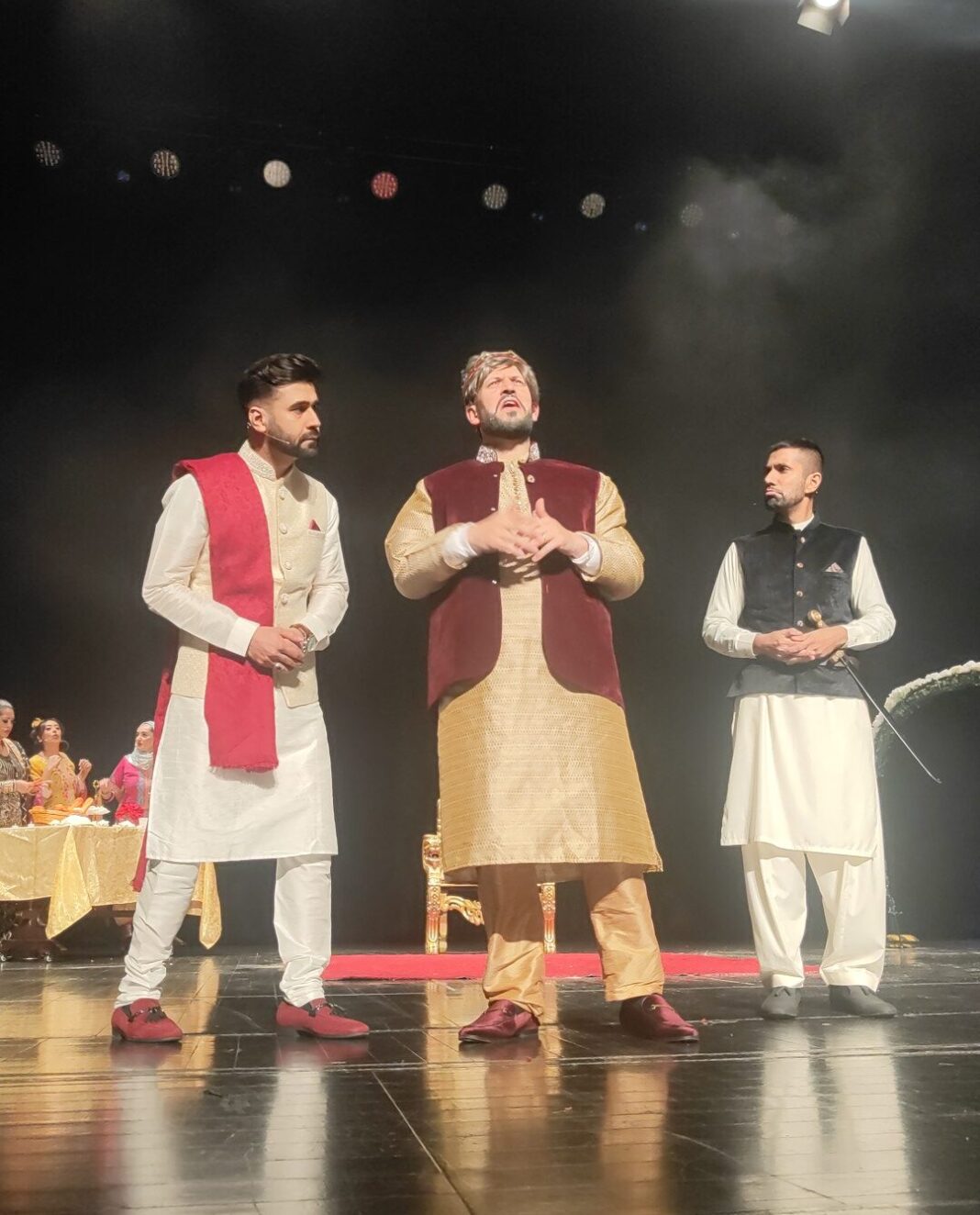
Manchester’s Vermillion saw a very nice turnout last weekend as the crowd awaited the start of Cinder’Aliyah: The Great Muslim Pantomime, a reworking of Cinderella, the classic fairy tale that we all know and love. With it being the first Muslim-themed pantomime to be added to The University of Kent’s David Drummond Pantomime Collection, the country’s largest pantomime archive spanning four centuries of British pantomime history, the large audience was no surprise.
However, it’s safe to say that the main attraction to the show was the director and writer, Abdullah Afzal, best known for playing Amjad Malik in the award-winning BBC sitcom Citizen Khan. Since then, Abdullah has gained a large following of his own through his comedy sketches on social media. His evolution from actor to writer is impressive, particularly because his career wasn’t planned.
“I was trained as a hafiz [a Muslim who knows the Qur’an by heart], I went to aalim school to become an aalim [Islamic scholar] and do speeches around the country as a 14/15-year-old kid,” Abdullah explains. “I went through some hardships that led my family to say, “Go and do what you want”, so I did Drama in college. An agent watched me, signed me up, and I got my first TV job at the age of 17.
“I think I was lucky; luck has got a lot to do with what we do.”
Representation of Muslims
There is no denying that the arts, whether it be on screen or stage, still have a long way to go when it comes to truly representing Muslims. A study carried out by the Centre for Media Monitoring in 2021 found that almost 60 per cent of articles portrayed Islam negatively and one in five associated the faith with terrorism or extremism, and this is often reinforced instead of challenged in mainstream films. Abdullah takes the matter into his own hands through the Cinder’Aliyah tour.
“I feel like I’ve been personally dealt a bad card when it comes to representation; I don’t get certain roles sometimes because I don’t look Pakistani enough and I don’t get other roles because I am Pakistani, so I felt like I was stuck between a rock and a hard place. And this kind of thing is important because not only have I put out a Muslim/South Asian pantomime, but we’ve also given people a chance to shine that probably wouldn’t have been given this opportunity in the mainstream. It’s a great step for these artists.
“There are so many talented people that haven’t been given an opportunity and that’s one of the most exciting parts of this job, when I’m looking for people to be in my shows. I find people that are undiscovered but incredibly talented. This pantomime is proof of that.”
Characters
The cast captures the diversity of the Muslim community through not only their appearance, with Cinder’Aliyah (played by Sajal) wearing the hijab alongside Shagufta, one of the Ugly Stepsisters (played by Lubna Saleh), but through the very talents Abdullah speaks about. From the honeyed singing voices of Cinder’Aliyah and The Prince (played by Hussnain Lahori) to Nana G’s comedic puppetry (by Tehseen Jay, creator of The Nana G Show), it was uplifting to see a pantomime that is different to the ones I grew up watching but so familiar because of its relatability.
“I wrote it in a certain way but when it came to directing it, I’m very laid back. I’m not really someone who loves to get too stuck in the direction because characters are almost an extended version of yourself. I like to give the cast the basics of what I expect the character to say and to do and then allow them to ad-lib within the pantomime and develop the character. There are so many characters within this pantomime that have developed over the two years that I’ve created from something that was such a small, silent character to this big personality. For example, The Guard in the show started off with just a few lines, now he has so many. His entrance alone gets the audience laughing and that’s all coming from him, not from me.”
British Muslims and the arts
The laughs from the audience were a sign of how much joy there can be in simply seeing yourself represented. But they were also very telling of how much the average British Muslim has been missing out on this. While it is true that we are beginning to see more Muslim and South Asian faces on stage and in theatre spaces, it’s refreshing to see a national tour bring the theatre experience to an audience within this community that is far from your typical theatre-goer – parents with their children, friendship groups of all ages, and even “aunties and uncles” – and it just goes to show how vital storytelling and representation are.
“I think representation is important because as a community, as a people, we want someone to represent us. We like people to do things that we want to watch and to see. Without representation we don’t get that we get certain things put in one way, we don’t get to tell our stories. And representation is about that. It’s about telling stories from where you’re from. I always say I’m a hybrid – I’m not just Pakistani, I’m Muslim, British, a Manc, a Cheetham Hill boy; I’ve got so many identities and I want to show them off. Representation is not just about skin colour, but who you are as a person.”
What’s next?
This is the beauty of theatre. The stage transcends the barriers of socio-economic background and gives everyone the ability to take part in this shared experience. As our community grows, so does the need to recognise and support the diversity within it. The act of producing and performing your own art is a political one; it allows Muslim artists to take matters into their own hands and reclaim representation. Cinder’Aliyah is important in this respect – it seeks to do away with the stereotypes that surround Muslims here in the UK and present them as multifaceted individuals with lives that are filled with joy, pain, love and laughter.
Although it is his first production of a pantomime, it seems that Abdullah has struck a chord with this community in a way that other theatre has failed to. He already has a second pantomime tour in the works and will begin casting next month for Beauty and the Balah, a twist on Beauty and The Beast.
The pantomime continues touring until 29th January 2023 and proceeds from every ticket purchased will go towards Penny Appeal’s Pakistan Floods Emergency appeal: https://pennyappeal.org/event/the-great-muslim-pantomime











